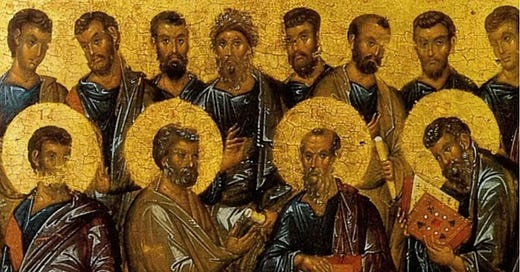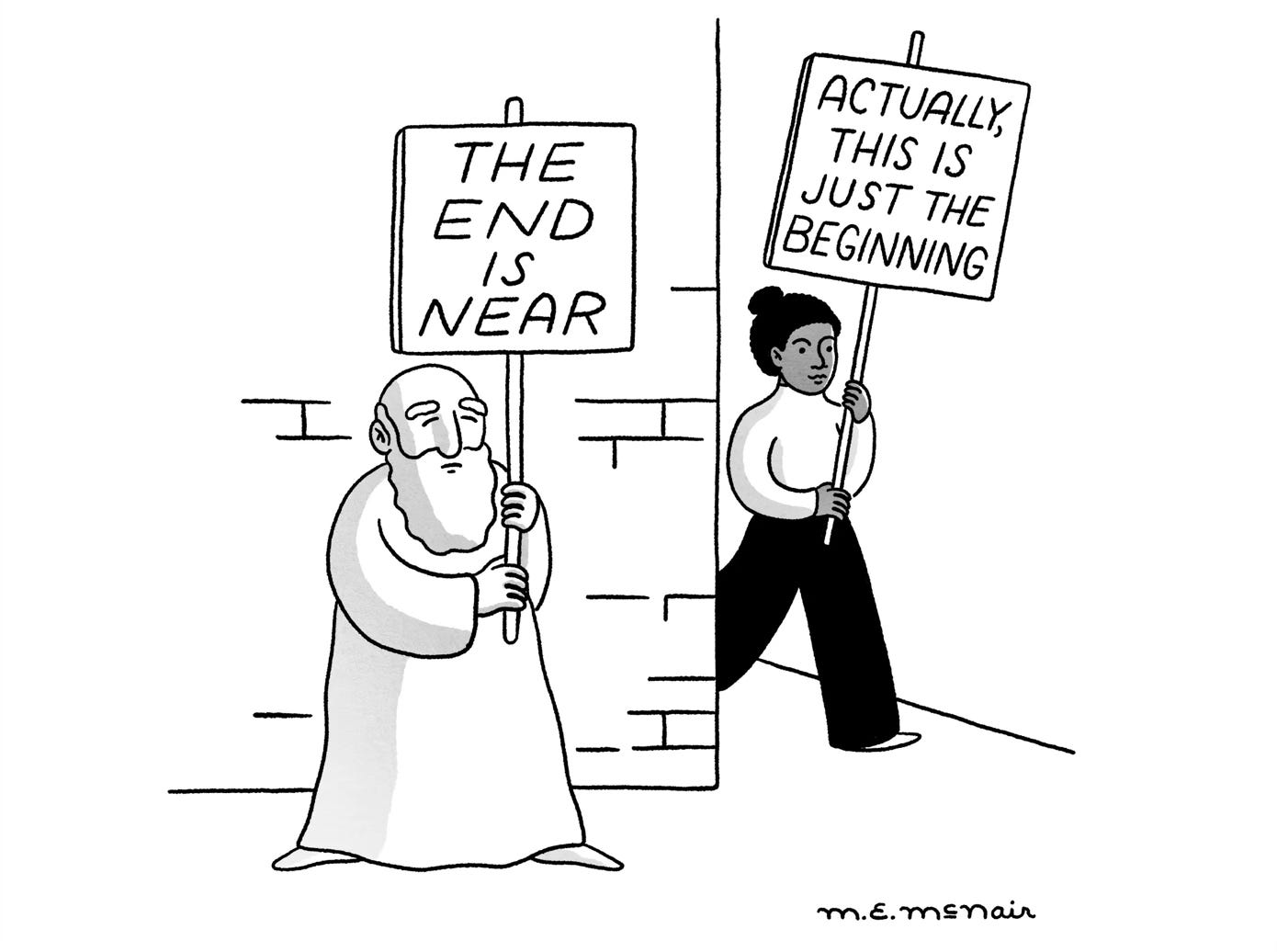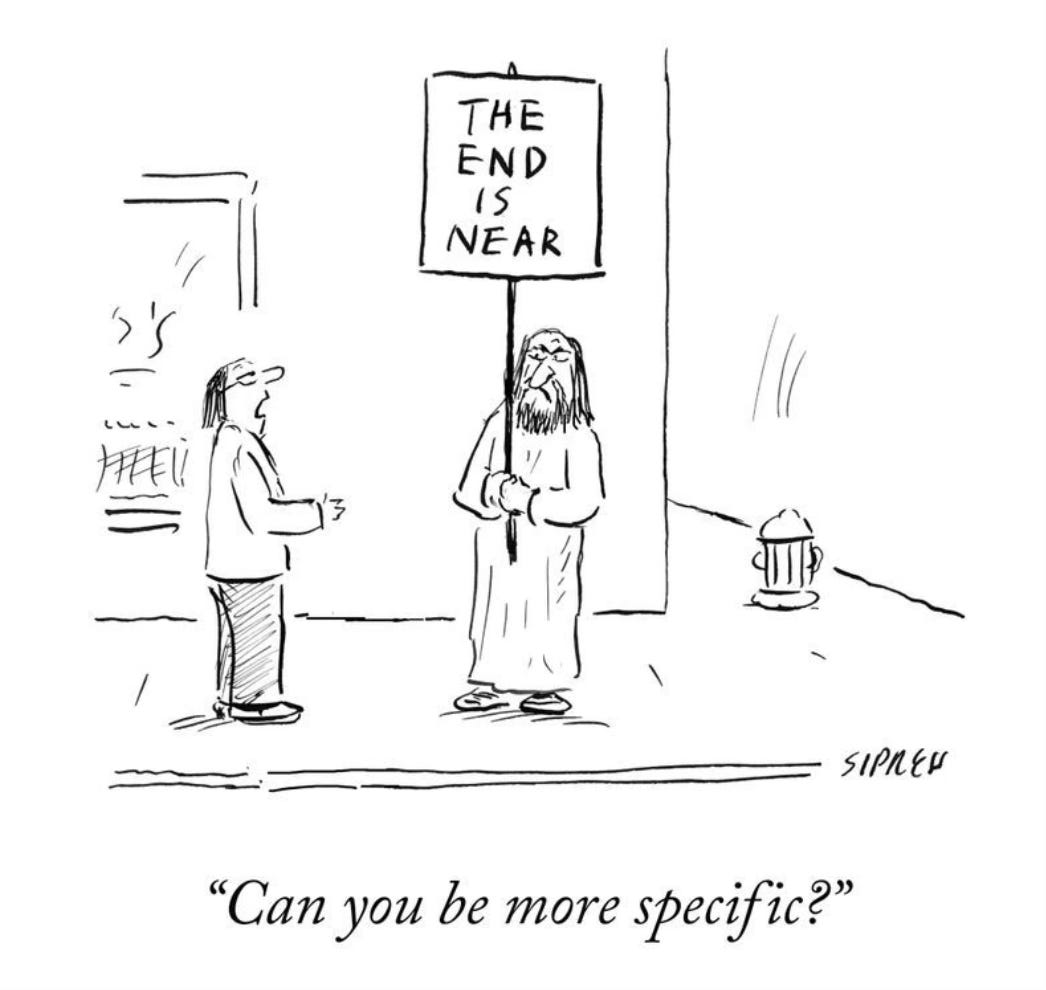Young people thirst for adult guidance on how to surmount the climate crisis, yet we adults are often just as overwhelmed as they, in part because of an avalanche of climate news. What we all need is a clear simple guide that sorts through the clutter for us. We have a model for this, from one of the most successful educational campaigns in history.
The Roman province of Judea in 50 CE roiled in intellectual and religious turmoil. One generation after the death of Jesus of Nazareth, his followers faced diverging views about what they should do, and how they should live. Many expected his Second Coming, and the end of the world, at any moment. All sought practical guidance about how to live their lives day-to-day, in accordance with his new revelations. Numerous different versions of his life (“gospels”), and contending interpretations of them, circulated—which should people follow?
Source: “The oldest catechism in Christian history dates from the 1st century” Aleteia.org.
Humans today confront a similar situation. We too, have received the momentous revelation that our world could be coming to an end, as a result of the climate crisis. And now we’re deluged by climate news, stories, and contending prescriptions.
For early Christians, a major step forward was the production of the Didaché, “The Teaching”, a brief, clear, and practical compilation of Jesus’ revolutionary teachings, published sometime between 65 CE and 80 CE.1 It drew broadly on the available Gospels, but also on the practices of the most successful Christian communities. It largely avoided religious theory, and focused on what a good Christian should do, and avoid doing.2 Many followers found there the comprehensive but simple guide they needed.
Hannah Ritchie’s Not the End of the World offers this kind of guide.3 Ritchie, Deputy Editor at Our World in Data and Scottish environmental scientist, provides the best manual to date on how to sort out competing approaches, not just about climate change, but also six other sustainability issue areas: Air pollution, deforestation, food, biodiversity loss, ocean plastics, and overfishing. In all these areas, her judgements are well-grounded, hard-headed, encouraging, and hopeful.
Don’t take my word for it. See what others say4:
Hannah Ritchie has charted an invigorating, inspiring, often surprising tour of recent human history and the many marks of progress it contains. (David Wallace-Wells, author of The Uninhabitable Earth)
"Ecopragmatism at its best shines throughout this book. The surprising message in the data is that human civilization is far along toward solving planetary problems. Hannah Ritchie shows how building on the successful trends can finish the job” (Stewart Brand, founder of Whole Earth Catalog)
"With comprehensive data and sometimes counterintuitive conclusions, Hannah Ritchie does for the environment what Hans Rosling did for health . . . (Bill Gates, Microsoft founder and major climate investor)
“I find it hard to express how much I love this book…Her book shines with practicality and positivity. It will banish your feelings of doom, help you focus on what’s really important and make you want to be a part of the most effective solutions to our greatest challenges. (Rutger Bregman, author of Utopia for Realists: How We Can Build the Ideal World)
These recommendations are all the more notable as their authors represent very different approaches to the climate crisis.
In succinct historical summaries, Ritchie describes the short-sighted practices that led to the sustainability crises in the book. But she also explains how humankind is well advanced on the path to surmounting them, and how to build on those successes.
Here are some key aspects of Ritchie’s main recommendations to mitigate global heating.
Source: Elisabeth McNair, www.CartoonStock.com
Like other good guides to global heating5, Ritchie assesses each factor contributing to greenhouse gas emissions, and then offers ways to reduce them. For example, food accounts for 24% of emissions. Ritchie writes,
Thankfully, the list of things that really make a difference is short. Here are the five big things we need to focus on.
Eat less meat and dairy especially beef
Reduce overconsumption
Reduce food waste
Adopt the best and most efficient farming practices we can
Close yield gaps across the world.
Note that the first three are within the reach of any individual consumer. The other two call for improvements in farming practices, especially in the developing world. She’s clear about the need for action at both the individual and the social levels.
Source: David Sipress. www.CartoonStock.com.
One way that Ritchie’s climate guide differs from others is her willingness to go from what should be a focus to what should not.
When it comes to food, there are a few interventions that matter much less than we think. Eating locally produced food doesn’t make a big difference. Nor does eating organic food. In fact in both cases these choices could actually increase our emissions if we’re growing foods that are better suited for other climate or conditions. The plastic packaging of our food also doesn’t matter much for a carbon footprint.
Note that she does not recommend against these choices—she’s simply clarifying that they do not help to reduce greenhouse gas emissions. But it's refreshing to hear an expert advise us to lighten up!
People shouldn’t be stressed out by every tiny decision they make. It can get overwhelming. Tackling climate change feels like a massive sacrifice that has taken over our lives. That would be okay if all of these actions were really making a difference, but they’re not. It’s misplaced effort and stress, sometimes even at the cost of the few actions that really will matter.
She explains the concept of ‘moral licensing’: the psychological trick we play on ourselves where we justify one behaviour because we’ve made a sacrifice somewhere else. (Hmm. Touché!) But this just clutters and burdens our lives even as it distracts us from making a tangible difference.
When we ask people what they think are the most effective things they can do to reduce their carbon footprint, they often mention the stuff that has the smallest impact: Recycling, using more efficient light bulbs, not leaving the television on standby or hanging their washing out to dry. They often miss the big stuff: eating less meat, switching to an electric car, taking one less flight, insulating their home or investing in low carbon energy.
That’s why she backs up every recommendation by to-the-point data and analysis: Her guide helps “people understand the handful of behavior changes that really make a difference”.
The Didaché, too, warned of practices for early Christians to avoid (Ch. 5, “The Way of Death”), just as it emphasized the positive and the constructive (Ch. 1, “The Way of Life”). In between, it too used a single text and clear language to summarize the major and minor precepts (but distinguishing between the two groups!) by which followers could affirm their commitment through daily actions.
Any movement striving for major social change must come up with a solution for how to explain itself simply to the mass of its followers, those who are too weighed down with everyday cares, or disinclined to deep learning. Even better if it makes the actions it calls for realistically attainable!
The Didaché was the first version of the Christian catechism, a manual for instruction, which soon came to take the form of questions followed by answers—an early version of “Frequently Asked Questions” (FAQs).6 It and numerous later versions instructed young, new, and forgetful Christians as their religion grew from the thousands into the hundreds of millions.
Growth of Christianity in the Roman Empire7
Given the scale of the climate crisis, the climate movement should aim for no less success, and in a much compressed timeframe. Ritchie’s Not The End Of The World is a good step forward. But obviously, carrying out a 2000-year old formula, however well, will not be enough. Those of us committed to a better climate future need to innovate to develop ever more effective ways to reach everyone.
But here’s something we can all do, now: Buy a copy of Ritchie’s book and organize a group (of family members, friends, fellow community members, or work colleagues) to read and discuss it, a chapter at a time. You’ll be giving everyone involved a gift.
Each of my posts is part of an extended strategy for how to surmount the climate crisis. This evolving strategic analysis is organised by themes, in a separate post, “Posts, organised thematically”, which I invite you to consult.
“The oldest catechism in Christian history dates from the 1st century”. By Daniel Esparza. Aleteia.org. Published August 14, 2019. Accessed September 25, 2024.
For an English language version: The Didache. NewAdvent.org. Translated by M.B. Riddle. From Ante-Nicene Fathers, Vol. 7. Edited by Alexander Roberts, James Donaldson, and A. Cleveland Coxe. (Buffalo, NY: Christian Literature Publishing Co., 1886.) Revised and edited for New Advent by Kevin Knight.
Not the End of the World. By Hannah Ritchie. Little, Brown Spark, 2024
In their own reviews of the book, reprinted in Not the End of the World.
There are many guides to climate action. I appreciate the Yale Climate Connection’s, for its positive, constructive choices: “Yale Climate Connections has assembled a bookshelf of titles that offer grit, gumption, and inspiration. The 12 titles have been sorted into six pairs that address this challenging moment at different levels and from different angles. Whatever their age, aptitudes, or aspirations, readers will find authors who can reach them where they live.” (From the YCC’s introduction to its list.)
“Catechism”. Wikipedia contributors. Wikipedia, The Free Encyclopedia, Accessed September 25, 2024.
“How Christianity conquered Rome through simple math”. By Kevin Dickinson. BigThink.com. July 23, 2023. Accessed September 25, 2024. Dickinson here reports Bart Ehrman’s estimates of the growth of the Christian population in the Roman Empire in The Triumph of Christianity: How a Forbidden Religion Swept the World. Simon and Schuster, 2019.









Javier,
Excelente.. !
Have enjoyed reading you summary analysis and agree that the “end is coming”, but might not be just around the corner…
Hector.